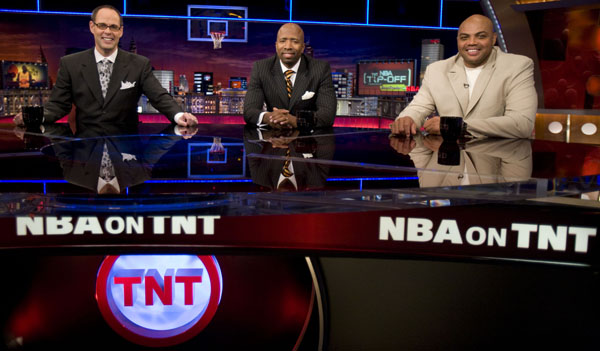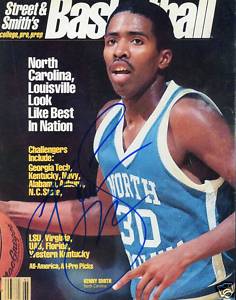The RTC Interview Series: One-on-One With Kenny Smith
Posted by rtmsf on March 22nd, 2012Rush The Court is back with another edition of One on One: An Interview Series, which we will bring you periodically throughout the year. If you have any specific interview requests or want us to interview you, shoot us an email at rushthecourt@yahoo.com.
Last week we were lucky enough to spend 15 minutes with one-half of the Inside the NBA analyst crew on TNT, Charles Barkley. This week we are back with his compatriot on that show as well as during Turner Sports’ studio coverage of the NCAA Tournament, Kenny Smith. The Jet is promoting Coke Zero during March Madness with its Watch & Score Instant Win Game, where fans pick a team to advance to the next round and a with a correct pick, a shot at winning a trip to the 2013 Final Four in Atlanta.
Rush the Court: Kenny, let’s jump right in to the biggest news coming out of the weekend, which is that the point guard at your alma mater, North Carolina, has a broken wrist and may or may not be able to play this coming weekend. Can you relate the situation facing Kendall Marshall and UNC right now to the situation you dealt with in your freshman season there when you broke your wrist?
Kenny Smith: Except for the timing of it, it’s pretty much exact. He broke his wrist. I broke my wrist. He has a pin in his wrist. I have a pin in my wrist. At the time, I was out three or four weeks and it was earlier in the season, but I had to wear a cast when I came back. Keep in mind, though, this is not an injury. This is not an injury like a sprained ankle. This is a break. It’s broken. He has a broken wrist. Guys can play through a sprained ankle or whatever else if it’s an injury, but this is a broken bone. What makes him a great player is his ability to distribute the basketball. His effectiveness is a little different than what I could do then, in terms of scoring and so forth, but I am not sure that he can get back on the court and play with a broken wrist.
RTC: He had surgery on Monday and nobody seems to be able to say whether he’ll be able to play or not at this point. My question is whether a guy who isn’t necessarily a great scorer needs to have full capacity of both hands in order to help his team out. Can he dribble or distribute the ball at all with a pin in his wrist five days after breaking it?
KS: The question isn’t whether he can do those things, the question is whether he can get on the court. Because if he can get on the court, he can manage it. But when you’re talking about a broken wrist and whether it will bend without terrible pain or even if you can move it at all, that’s the bigger issue. But if he can get on the court, he can manage it. The problem is that very few people in his position can get on the court that quickly.
RTC: Do you think he’ll play?
KS: I honestly have no idea.
RTC: Ok, moving on to some of the issues surrounding Marshall’s injury, and since you’ve been on teams at both the college and pro levels where you had to deal with key player injuries, what are the rest of the Tar Heels feeling right now? How are they handling the possible loss of Marshall from the lineup?
KS: Well, if you’re in that locker room, as a player you have to take the attitude of, ‘so what?’ You have to think like that if you’re a Tyler Zeller, a Harrison Barnes, a John Henson. You have to have that attitude that it does not matter. And if you’re a player who was behind Kendall Marshall on the bench, you need to say, ‘ok, now I get my opportunity. Coach hasn’t been playing me, but he should have been playing me all along.’ That’s the only way you can look at it.
RTC: So let’s talk about some of the other teams in the Tournament. I spoke with your colleague Charles Barkley last week and he’s been clearly on record saying that he doesn’t like to pick “little teams.” But you’re a guard and if you look at the last two national champions, both of those teams [Duke and Connecticut] at least offensively were perimeter-oriented squads. With Kemba Walker/Jeremy Lamb leading the way last year, and Kyle Singler/Nolan Smith the year before, it’s been perimeter play that’s seemed to be the most important way to win a championship. Any thoughts on this theory?
KS: You can live by the three in college. You can also die by the three, but in college, you can live by the three. The reason is that in college not everybody can have a big man. There are 325 teams and not enough quality big men around the country to fill those spots. Really, there are only four or five quality big men anywhere, so that’s a big difference in terms of how far you can get without a good big man in college versus the pros. And keep in mind that even with a big man, you don’t have to be the most talented team to win because it’s a knockout situation. You only have to be the best team for that night.
RTC: It was a great first weekend of action. Let’s talk about some quick hits. What was your biggest surprise coming out of the first couple of rounds?
KS: It has to be Lehigh and Norfolk State, two #15 seeds beating Duke and Missouri. That just isn’t something that happens very often, but on that night, those two were the better teams.
RTC: To that point, there was a good debate among some media and fans as to which one was the bigger upset between the two…
KS: To me, it was Norfolk State. In part because Duke was down a player [Ryan Kelly] and also just because of the conference that Norfolk State comes from [the MEAC] and that they’re one of what we call the historically black colleges.
RTC: Was there any team or player who you were disappointed in last weekend, maybe you thought they should have done more than they did?
KS: No. Anything can happen. That’s what makes it March Madness.
RTC: What are you most looking forward to in terms of matchups this coming weekend?
KS: NC State versus Kansas, mostly because the Wolfpack are playing very well and they’re really difficult to guard.
RTC: Ok, let me transition a little bit back to your NCAA Tournament experiences. You had a very successful career at UNC, no doubt, but let’s look at what happened here. In 1984, you had the broken wrist, and your team was #1 all season, but you guys lost to Indiana (and media colleague Dan Dakich) in the Sweet Sixteen. The next year, as a #2 seed, you guys lost to the Cinderella, Villanova, in the Elite Eight. In ’86, you lost to Louisville in the Sweet Sixteen after being #1 most of that year. Your senior season, you and UNLV were #1 most of the season, but Syracuse got you guys in the Elite Eight again. Now, you’ve had a lot of success, especially in the pros where you won world championships, but do you feel like those losses meant something was missing from your playing career. Do they still sting?
KS: Aww, man. I still remember when I lost in the third grade championship game. I’m still mad about that! It was CYO league, and we lost to St. Pascal’s, and I still think about that sometimes.
RTC: So I guess the answer is yes…
KS: Oh, most definitely.
RTC: Did one of those four years in particular stick out where you felt you really let a chance slip away?
KS: No, but there wasn’t a year where I was at North Carolina where I felt we shouldn’t have won it all. In three of my four years we had an injury where someone got hurt where it really made a difference on what we were able to do in the Tournament.
RTC: Along those lines, you were a four-year player at UNC, and most guys back then were at least three-year players. How do you feel like guys leaving early after one or at most two seasons has changed the game? Do you think quality has suffered at all?
KS: Well, first of all, the players are better nowadays than they were when we were playing. Some of the things they can do… I don’t get into all that argument, whether you want to say you’re a purist, or what have you, that things were better back then. The thing is that the players individually are much better than they were then.
RTC: Well what about the teams, though? If you have more time over a few years to build a team like the group you had with Brad Daugherty and you, Sam Perkins and so on. Over time, don’t the teams develop a little better chemistry and continuity?
KS: The best teams are still going to be the best teams because they have the most talent. That’s all there is to it.
RTC: Ok, Kenny. Well I thank you for your time today, and I’ll look forward to watching your analysis throughout the rest of the Tournament.













































